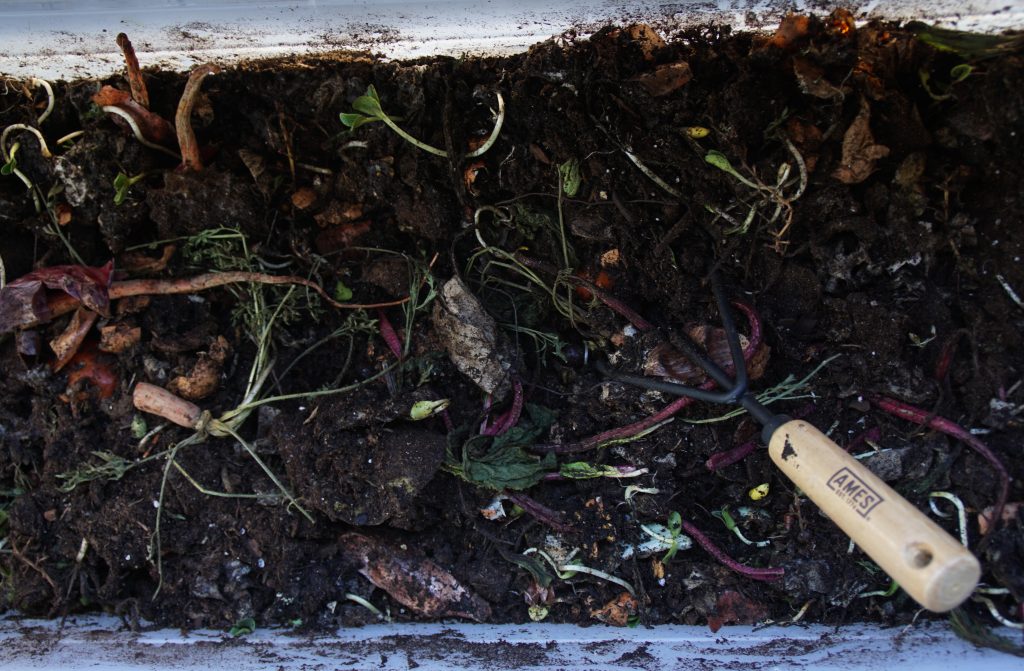Food needs oxygen to decompose properly. Many people put their food in the garbage to send to landfills, resulting in rotting scraps suffocated under a sea of trash. With no oxygen, the decomposing food, rather than release carbon dioxide, lets out a powerful amount of methane, a more harmful greenhouse gas. To combat this, people can set up compost bins to naturally decompose food without sending it to landfills.
General composting rules
Before placing food or paper in your compost, be sure to chop or tear it in little bits. For the most part, avoid placing meat, dairy or citrus products in your compost, as it can quite easily spoil it. Generally, you’ll want to have a small rake in hand to turn your compost bin regularly to increase the rate of decomposition. When you’ve finished composting, you’ll notice the resulting soil color is rich and vibrant with nutrients. You can use the finished product as mulch, filling for your potted plants or reuse it in composting.
In-home compost
Whenever in-home composting is mentioned, the smell is what turns most people away. In order to avoid this, you’ll want to keep a healthy balance of soil and food waste. Purchase a plastic storage bin with the size largely depending on how much food your household consumes. A 10- to 15-gallon container should be fine. Drill some holes in the lids to allow your compost to get some air. In the bin, be sure to keep a ration of three-parts brown, consisting of coffee grounds, leaves, soil, paper and other materials, to one-part food waste. Create layers of food waste and brown and regularly turn them over. If it starts to smell, add more soil. Balance is key.
Outdoor composting
Outdoor composting is great if you have the space for it. You can create a pile in your backyard or set up a bin in order for it to retain moisture quicker. Although winter can halt the process of decomposition, it will start up soon when temperatures warm, so be sure to have a big enough bin to account for the buildup. It’s recommended to use a five-inch by five-inch by five-inch area. You’ll want to create nice layers of brown and green with a similar ratio as an in-home compost bin. The process of decomposition will rapidly increase during the summer months.
Vermiculture
Vermiculture is the use of worms to speed up the composting process. You can purchase a flow-through worm bin with multiple trays, which is very useful for apartments. These can ensure proper drainage and structure. If you’re on a budget, you can make a bin yourself. You’ll want to purchase a bin for placing your worms in. Make sure to drill many small holes across the lid for aeration, which allowed air and nutrients to enter the soil. First, place dry bedding material into the trays by using paper, leaves and other browns like crushed eggshells. Be sure to add water to make the bedding a moist environment for the worms. Afterward, you can place your worms in the bin to start feeding them. They should be fed two times a week and food should be buried beneath bedding. Be sure to keep a good balance between bedding, food and moisture. Place your worms in a cool and dark area, but not too cool to let them freeze. After about six months, you’ll have to remove the materials in the compost because they’ll turn to black worm castings. These castings are wonderfully rich in nutrients and great to be used in soil.
Bokashi composting
Remember when I said you couldn’t add meat, dairy or citrus to conventional composting? Well, bokashi composting offers a solution to that problem! Bokashi uses specialized microbes to break down food matter through fermentation without oxygen. Because of the sensitive nature of bokashi, it’s recommended to purchase all supplies. SCD Probiotics offers an excellent kit with an airtight container and bag of bokashi, the fermented bran used for composting. You’ll want to place the bokashi and food scraps in layers initially and then mix them around. After mixing, close the lid tightly and repeat the process until the bin is full. There’s a spigot on the outside to drain the compost “tea” created during compost. This tea is great for your potted plants. After the bucket is full, you can bury the compost and it will break down quickly in one week during the summer and one month during the winter.
Composting is an easy and affordable step in the fight against climate change. You’ll get to see the transformation of your smelly and decaying food into beautifully rich soil while reducing methane production. You may not have total control over your garbage management where you live, but at least you can have a say over where your food waste goes.



